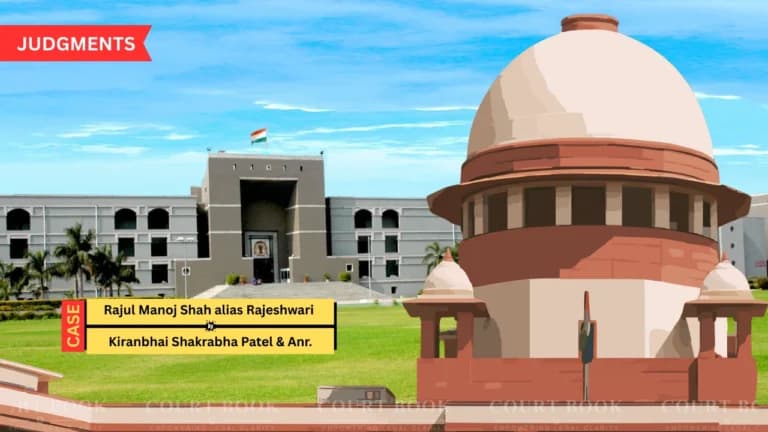In a ruling that could shape how counter-claims are treated in civil suits, the Supreme Court of India on Friday set aside a Gujarat High Court order that had permitted a counter-claim in a decade-old property dispute. The bench, led by Justice Pamidighantam Sri Narasimha and Justice Joymalya Bagchi, held that the counter-claim was not maintainable and came far too late in the proceedings.
Background
The case revolves around a bungalow near Stadium Char Rasta in Ahmedabad, originally owned by the father of appellant Rajul Manoj Shah, also known as Rajeshwari Rasiklal Sheth. After her brother’s passing, the property came to be shared between Rajul and her sister-in-law. Trouble began in 2011 when the sister-in-law entered into an agreement to sell part of the property to Kiranbhai Shakrabhai Patel, the respondent. Rajul challenged this transaction in 2012, seeking a declaration that her co-owner could not sell without consent.
Read also: Supreme Court Criticises High Court for Diluting Murder Charge, Upholds Conviction Under Attempt
Matters grew more complicated when the sister-in-law passed away in 2013. Eventually, the court appointed the Nazir of the City Civil Court, Ahmedabad, to represent her estate. Patel, years later in 2021, tried to amend his written statement and include a counter-claim for partition and specific performance of the 2011 agreement.
Court’s Observations
The Trial Court had rejected Patel’s application, calling it an “abuse of process” since it was filed long after issues were framed in 2019. It also held that a counter-claim cannot be directed solely against a co-defendant. The High Court, however, overruled this and allowed Patel’s plea.
But the Supreme Court was firm. “A counter-claim must be against the plaintiff, not solely against a co-defendant,” the bench observed, citing the earlier precedent in Rohit Singh v. State of Bihar. On the timing of the counter-claim, the court noted that it was filed nearly nine years after the suit began and two years after issues were settled. “The defendant cannot be permitted to file counter-claim after the issues are framed and after the suit has proceeded substantially,” the judgment stressed.
Read also: Supreme Court Quashes Calcutta HC Order Allowing Bid Correction in West Bengal Toll Contract Dispute
The bench also pointed out that Patel was seeking specific performance of an agreement from 2011 without having taken timely action. “It cannot be believed in general circumstances that he would have waited for a title clearance certificate even after the plaintiff had filed a suit challenging the agreement,” the court remarked.
Decision
In its final order, the Supreme Court allowed Rajul Manoj Shah’s appeal, setting aside the Gujarat High Court’s decision. The apex court restored the Trial Court’s order rejecting the counter-claim, making it clear that procedural safeguards cannot be bypassed in the name of convenience. The ruling shuts the door on Patel’s attempt to enforce the disputed 2011 sale agreement through a counter-claim.
Case: Rajul Manoj Shah alias Rajeshwari v. Kiranbhai Shakrabha Patel & Anr.
Date of Judgment: 12 September 2025















